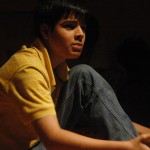A Report on the Bengali Theatre Workshop
The Bengali theatre workshop was held in the same place as the music workshop. It was spacious and airy. It provided a comfortable atmosphere in which to work. The students were energetic, but I got the sense that the kind of readiness that I had seen in the English and Hindi theatre workshops even prior to the day’s first run-through was missing here. I could not put a finger on what exactly was the cause, or if it was just lack of sufficient rehearsal. The conductor instructed his cast to only focus on saying their lines correctly in the first run- through. Therefore they sat in a circle on the floor and delivered their lines on cue. I’m not sure if this way of practicing works, because the actions and expressions accompanying dialogue are equally important. A few missed their cues, or said their lines incorrectly. But at least the play’s basic structure, or direction, seemed to have been established.
The second run-through involved the rehearsal of the whole play, actions included. Again, it was obvious that it still needed some work. The issues it dealt with—the prejudices in the education system are issues that have been topics of discussion for a long time now, for example, the notions people have about private and government schools. This was actually well brought out, by depicting first a possible scene at a government school, where the teacher hardly cares, and then a scene at a private school, with its strict focus on learning English (with its ‘elite’ connotations) and extreme workload. By depicting it in this way, the play brought out the ills in both systems. The point where the class is learning the letters of the English alphabet (‘A’ for apple, ‘B’ for ball) and the teacher brushes aside ‘C’ for cat, saying instead ‘C for Coca Cola’, was a light, but, in my mind, a clever touch. It was what seemed to be a passing reference to the mass appeal of junk food/drink. The play also put forward the idea that our society values education but has not found a fair way to attain it. But I kept thinking that the rehearsal needed to be far more polished and taken more seriously, in order for these ideas to be effective. I also wished the play was a little more innovative. There were bright areas though, for example the scene in which the boy, under pressure to study for his history exam, gets lost in his daydreams and starts to fantasize about dancing with Mumtaz Mahal, then suddenly finds himself holding his mother’s hand instead of Mumtaz’s.
There was another scene in which the same character decides that a chapter he is studying would make a nice picture, and sets about painting a canvas. Here, I saw an allusion to the recent film Taare Zameen Par, which also made a plea to parents to allow their children to dream and pursue passions or talents. But, for a play so related to their direct personal experiences, the participants did not contribute with ideas, and the conductor did not pitch in as much as necessary either, interfering only occasionally to correct certain gestures or delivery of dialogue. The workshop called for more involvement from all quarters. At the time, it all seemed to be a bit of a chore.
— A report by Shamoni Sarkar
PeaceWorks intern















